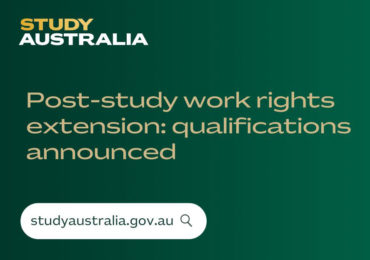Tasmania is a vibrant Australian state with tons on offer. Not only has Lonely Planet named it among the top ten destinations to visit, Tasmania also boasts one of the world’s best universities — the University of Tasmania (UTAS).
In recent years, there’s been large increases in international student numbers – and it’s no wonder. It’s very easy to fall in love with Tasmania.
Here are eight reasons why Tasmania should be at the top of your list.
1. It’s one of Australia’s most affordable states
Although many international students might place Melbourne or Sydney at the top of their list, one drawback of those bigger cities is the cost of living. Melbourne and Sydney continue to get more expensive, while Tasmania’s housing and living costs have remained relatively stable over the past few years.
Tasmania continues to boast one of the lowest costs of living in Australia. Even if you live directly in the city, you won’t be paying anywhere near as much as you might in Melbourne or Sydney.
Not having to worry as much about the cost of housing, groceries, and other expenses, means that you’ll have the cash to enjoy yourself when you put the books down!

2. It’s perfectly-sized for students
It can be hard to get around or meet new people in bigger cities like Melbourne or Sydney.
Take it from UTAS pharmacy student Monila Nadikudi: ‘After I got my bachelors degree in India I initially went to study in Melbourne, but I found it way too big. I really felt lost,’ she told UTAS Blog The Explorer.
UTAS also has smaller class sizes than many other capital city universities. That’s a massive plus, because it means there’s more opportunity to ask questions and get more personal attention from your lecturers. Smaller class sizes also provide the opportunity to workshop, discuss and debate ideas.
‘Our course coordinator calls every student personally, and asks how we’re going’, says Monila, ‘and we just don’t get that anywhere else’.

4 Ways To Choose The Best Country To Study In
3. It’s a great quality of life
Living in Tasmania is like living nowhere else in Australia. Its cities are small enough to feel comfortable and cosy. Yet they’re also big enough to still have all the shopping and nightlife you could want.
You won’t face traffic jams or city pollution as the cities aren’t dense, and public transport across Hobart or Launceston is hard to fault.
Ling Woollams, a Chinese student studying at UTAS, sums it up nicely: ‘If you want a real life, I think you’d better come here and have a look. After I moved to Tasmania I could breathe the cleanest air and drink the cleanest water. I feel I am enjoying my life every day.’
4. Exciting research opportunities
UTAS has a flourishing research department and is ranked among the top research-intensive universities in Australia. UTAS has a research division that’s over a century old, and helps the local and global community with pioneering research in a diverse number of fields.
‘We’re deeply connected through a whole series of rich partnerships with organisations here in Australia, but many further afield,’ says Professor Brigid Heywood, Deputy Vice-Chancellor of Research.
Some exciting research projects being undertaken at UTAS right now include:
– Chemical research for detecting homemade explosives
– Astrophysics research to map the universe
– Medical research into precision oxygen delivery to premature babies, and
– Building an autonomous underwater vehicle for Antarctic research
These are but a tiny fraction of the research projects, divisions and partnerships that are flourishing at UTAS right now. Check out the Research Partnerships Reel on the UTAS YouTube channel to dive in deeper.
5. A range of stand-out courses
UTAS have a range of courses across tonnes of disciplines. Three courses we think you should take a further look into are: the Master of Professional Accounting (Specialisation), the Bachelor of Engineering (Honours), and the Master of Professional Engineering (Specialisation).
Master of Professional Accounting (Specialisation)
The two-year Master of Professional Accounting (Specialisation) (MPAS) at UTAS is geared towards graduates who don’t have a background in accounting to develop the necessary skills for Associate Membership entry into a professional accounting body (like CPA Australia, for example).
Take Waqas Durrani, for example. Coming from Pakistan, he had previously completed his Bachelor of Business Administration, but now it was time for a change. Enrolling in an MPAS course at UTAS threw more opportunities at him than he probably ever imagined.
‘I got selected for the Vice Chancellor’s Leadership Award and I am also a student ambassador and student engagement leader for the University,’ he writes on The Explorer.
Bachelor of Engineering (Honours)
The 4-year Bachelor of Engineering (Honours) degree from UTAS will set you up with a world-recognised engineering degree, and the chance to work in some exotic places.
Check out Simon Younger’s story to see just how far an Bachelor of Engineering can take you. ‘I think the attributes of problem-solving that you get in Engineering are really very useful in a lot of different career paths’, he says. ‘I didn’t think that my engineering career would take me all around the globe, but it’s been fantastic.’
Master of Professional Engineering (Specialisation)
The Master of Professional Engineering (Specialisation) is designed to push students who wish to further specialise in civil or mechanical engineering.
Although Yue Song has held a position at the Department of State Growth for the past six years, thanks in no small part due to the experience and knowledge he picked up in his Bachelor of Engineering, he doesn’t dismiss the benefits of further education:
‘If I did [the Master of Professional Engineering (Specialisation)] course, it may help me to get a better job within the government, or a more senior position, which often requires postgraduate degrees,’ he says.
6. Awesome support for international students
Fewer international students in Tasmanian classes means that you have excellent opportunities to build your English language skills and make Australian friends.
‘My friends want to practice their English but they went to Sydney or Melbourne and there are just too many Chinese people so they didn’t get a chance to practice their English,’ says Ling Woollams.
Waqas Durrani also also has some sound advice for other international students.
‘Be patient, be open to change and experience everything that you can over here. Meet as many people as you can too. There is learning in every conversation,’ he says.
Here’s Why Malaysian Students Choose the University of Tasmania
7. Be wowed by spectacular nature
The spectacular natural environment of Tasmania is barely more than a stone’s throw from the major metropolitan areas. On the door step of the main Sandy Bay UTAS campus are incredible views of Mount Wellington.
From beautiful, sunny beaches in the summer to snow topped mountains in the winter, Tasmania’s natural beauty never disappoints.
‘I’m a true nature lover so the best thing about Tasmania is the nature. I love to go to the beach and look at the waves. It really relaxes your mind,’ Monila Nadikudi says.

8. There are plenty of migration opportunities
After finishing your studies, you might want to stay.
The good news is that it might not be as difficult to migrate to Tasmania as may be to migrate to other Australian states. In fact, if you’ve studied for more than two years in Tasmania, (plus met the requirements of what’s called the “Australian Study Requirement”) you’re eligible to apply for a state sponsored visa once you’ve graduated. Not only that, you are granted extra points towards your visa due to Tasmania’s “regional” status.
(Don’t forget that you can ask your Education Expert for the right referrals to find out more!)
Want to find out more?
Want more information about studying at UTAS? When you sign up to Sofiri, you’ll get your very own course counsellor to chat with online (for free)!





Nao testei ainda
Ola Kamily, obrigada pela sua mensagem. Acabamos de enviar um email com mais informacoes.
Thanks for sharing this type of information, it is so useful for me. This is the perfect post to comment on because it’s based on exactly the same topic as I want, excellent post nice work keep it up thanks for sharing the knowledge.
Thank you Shree.
Great Post!
Thank you so much for sharing this informative blog. This blog is very useful to me. Our university USHE also offers quality higher education opportunities for secondary school leavers, sub-degree. Visit us at http://uche.edu.hk/.
what are part time job popportunities for international students?
Hi Ashu, as an international stuent you can work 40 hours every two weeks while courseing the course, and full-time during any recess. The opportunities will depend on your skills and English langiage proficiency, to learn more visit sofiri.com/student and register now.